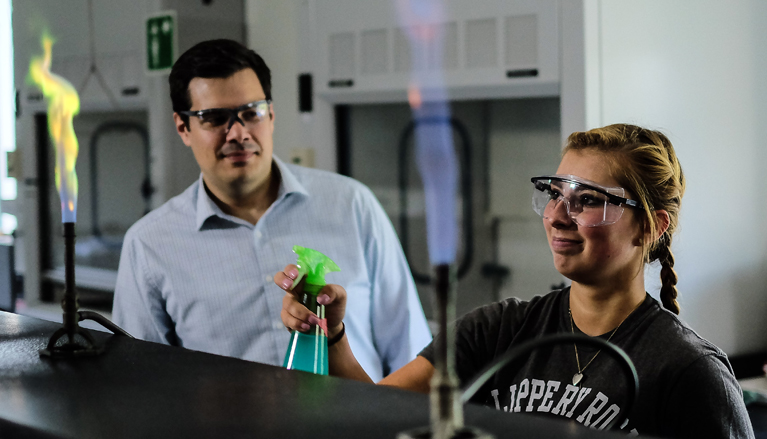SRU students give University high marks

Nov. 28, 2017
SLIPPERY ROCK, Pa. - Slippery Rock University students continue to rate their overall experience at the University higher than do students attending peer institutions, according to the latest report from the National Survey of Student Engagement.
NSSE, a national survey administered by the Center for Postsecondary Research, obtains information from hundreds of colleges and universities nationwide about student participation in programs and activities that institutions provide for their learning and personal development. The 2017 report details results from hundreds of thousands first-year and senior students attending more than 700 U.S. institutions in spring 2016.
Nearly 500 SRU first-year students took part in the survey while more than 400 seniors did the same. Response rates of SRU students outpaced those of its State System counterparts: 33 percent to 24 percent for first-year students and 30 to 27 percent for seniors.
"Our first-year student response rates continue to outpace the rest of the State System (33 percent to 24 percent), as well as the overall rate by 10 percent," said Carrie Birckbichler, associate provost for academic planning, resource management and assessment, "that's a great indicator for how seriously our students take their educational experience."
The response rate of SRU seniors also topped that of PASSHE counterparts (30 percent to 27 percent) and the overall NSSE sample by six percent.
SRU uses data from the NSSE to identify aspects of the student experience inside and outside the classroom that are working well and to discover other areas that can be improved.
To focus discussions about the importance of student engagement and guide institutional improvement efforts, NSSE created 10 "engagement indicators," organized under four broad themes that provide valuable information about distinct aspects of student engagement by summarizing students' responses to sets of related survey questions. The four categories include:
-Academic challenge (Higher-order learning; reflective and integrative learning; learning strategies; quantitative reasoning)
-Learning with peers (Collaborative learning; discussions with diverse others)
-Experiences with faculty (Student-faculty interaction; effective teaching practices)
-Campus environment (Quality of interactions; supportive environment)
NSSE's 2017 Snapshot Report for SRU compares the University's performance against its peers from within Pennsylvania's State System of Higher Education.
First-year SRU students ranked six engagement indicators - learning strategies; collaborative learning; discussions with diverse others; student-faculty interaction; quality of interactions; and supportive environment - "significantly higher" than their counterparts at other State System institutions, while SRU seniors ranked three indicators - collaborative learning; student-faculty interaction; and supportive environment - "significantly higher" than their State System peers.
One highlight of the report reflects the high percentage of engagement by SRU students in high-impact practices offered by the University. Examples of HIPs at SRU include Living-Learning Communities, service learning projects, internships, student-faculty research projects and study abroad opportunities.
"We know that student participation in HIPs is very beneficial with regard to engagement and long-term success," said Brad Wilson, associate provost for transformational experiences. "We are going to be implementing a new plan to help faculty integrate those high-impact practices into their courses, which will receive a special Banner designation so that students can seek them out easily. We also are continuing to strengthen our Living-Learning Communities, study abroad programs, research opportunities and other areas where students have learning experiences that last a lifetime."
Fifty-two percent of first-year SRU students participated in at least one HIP, while 14 percent took part in two or more. In addition, 66 percent of SRU seniors took part in two or more HIPs, while 23 percent took advantage of one.
"Research has shown that the deliberate engagement of students with a HIP has a direct influence on student success and we see that in our four-year graduation rate," said Birckbichler. "A more engaged student is more than likely a more successful student."
SRU's 2012 cohort four-year graduation rate was 50 percent as compared to 41 percent for the State System. For the most recent cohort, 2013, SRU's four-year graduation rate increased to 54 percent.
Other highlights from the report show that 50 percent of SRU first-year students felt that course work "highly challenged" them to do their best work, compared to 46 percent of their State System peers. Meanwhile, 48 percent of SRU seniors felt "moderately challenged" as comparted to 43 percent of their State System counterparts.
Ninety-four percent of SRU's first-year students ranked their overall experience at the University as "excellent" or "good," compared to 84 percent their respective State System equals; while 88 percent of SRU seniors felt the same way as compared to 85 percent of their PASSHE counterparts.
SRU students also outpaced their State System colleagues among those who would "definitely" or "probably" attend the University again with first-year students boasting a five-percent advantage (88 to 83), while seniors posted a six-point edge (86 to 80).
Results from the NSSE survey are used as part of SRU's continuous improvement program as well as being used for benchmarking purposes and to demonstrate an institutional commitment to improvement and effectiveness.
MEDIA CONTACT: Robb King | 724.738.2199 | robb.king@sru.edu

